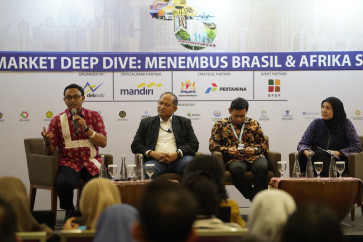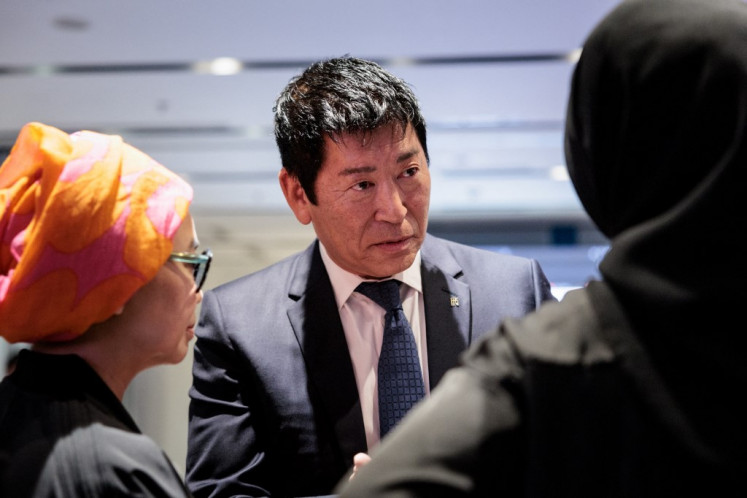Popular Reads
Top Results
Can't find what you're looking for?
View all search resultsPopular Reads
Top Results
Can't find what you're looking for?
View all search resultsSub-districts start getting e-ID equipment, new cards to follow
The Home Ministry overcame delays and started delivering e-ID equipment to local sub-districts on Wednesday, in advance of next week’s roll out of electronic identity cards
Change text size
Gift Premium Articles
to Anyone
T
he Home Ministry overcame delays and started delivering e-ID equipment to local sub-districts on Wednesday, in advance of next week’s roll out of electronic identity cards.
Irman, the Home Ministry’s civil registration chief, said on Wednesday that officials had also began establishing network connections between the offices.
“Device and network set up will wrap up on July 31 and will be up and running in August,” Irman said during a exhibition for reporters at the sub-district office in Menteng, Central Jakarta.
SCANNED:: A woman has her retina scanned during a test of the e-ID card system at the sub-district office in Menteng, Central Jakarta, on Wednesday. The Home Ministry is set to start issuing electronic identity cards to city residents in early August. JP/Wendra Ajistyatama
The ministry started to distribute desktop computers, fingerprint scanners, cameras and modem to the city’s 267 sub-district offices on Wednesday.
The administration is targeting to distribute e-ID cards to 7.49 million Jakarta residents by the end of 2011 as part of the central government’s program to establish a single identity number for every citizen.
A citizen’s e-ID identity number will be valid for life and be his or her only government-issued identification number.
The Jakarta Civil Registration Agency previously said that it would notify residents to report to sub-district offices to have their photos and fingerprints taken and their identity data verified after the equipment was in place.
“The e-ID distribution will be issued free of charge and citizens are encouraged to report any violations,” Irman said.
The ministry previously established a target of distributing e-ID cards to 105 million residents in 300 regencies and municipalities by the end of 2011 and to all eligible citizens in the nations 497 regencies and municipalities in 2012.
The central government has allocated Rp 3.6 trillion (US$424.8 million) to implement the e-ID card and single identity number plans.
According to the Civil Registration Law, all citizens who over 17 years of age or who are married must apply for an ID.
Separately, Jakarta Governor Fauzi Bowo rejected a Home Ministry request that the city provide e-ID cards to the Jakarta’s illegal residents and homeless population.
“We respect the ministry’s policy, but we are going to stick with higher regulations,” Fauzi said, referring to the Civil Registration Administration Law and a city bylaw that requires residents to obtain a letter of recommendation first from neighborhood leaders to obtain an identification card.
The city administration previously denied requests from residents of Tanah Merah in Plumpang, North Jakarta, to be registered as legal residents, whom the city said were squatting on land owned by state-owned oil company PT Pertamina.
North Jakarta mayor Bambang Sugiyono said on Wednesday that giving Jakarta identification cards to the residents would legalize their squatting. “It could lead more problems than it solves.”
According to the Central Statistics Agency’s local office, there are more 7,400 households with around 27,000 people living in Tanah Merah.
Sugiyono said that the Tanah Merah residents were still eligible for public services, including education and health care.
The land occupied by the Tanah Merah residents is a buffer zone for the Plumpang fuel depot set up by Pertamina. The company has insisted on keeping the buffer zone intact after a fire broke out in January 2009 at a storage tank.










